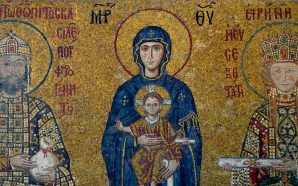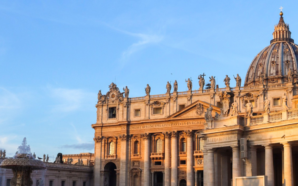The cardinal-archbishop of Vienna offered reflections just weeks before his 75th birthday. This story was originally published on 13 January 2020.
The fate of the Amazon region, the sexual abuse of women religious and a controversial AIDS charity concert in Vienna’s famed St. Stephen’s Cathedral.
These were just some of the issues that Cardinal Christoph Schönborn tackled quite candidly in an end of the year interview with the well-known Austrian Catholic weekly Die Furche.
The cardinal, who has been Archbishop of Vienna since 1995, turned 75 on 22 January. And in the two-page interview, he was asked to take stock of a number of pivotal and controversial issues the Church faced in 2019, beginning with the Synod of Bishops’ special assembly on the Amazon Region.
“For me, the central message is, without doubt, that the Amazon Region concerns the whole world – that is every one of us,” Schönborn said.
‘If you destroy the Amazon you destroy the world’
But he said it came as a shock – “a real thunderbolt” – when Prof. Hans-Joachim Schellnhuber of the Potsdam Institute in Berlin, said in the pope’s presence, “The destruction of the Amazon forest is the destruction of the world.”
That is quite an admission for a savvy Dominican theologian who was ordained bishop at age of 46 and ranks behind only one other cardinal-elector (Vinko Puljic of Sarjevo) for the number of years wearing the red hat.
Though Puljic was made a cardinal in 1994, and Schönborn in 1998, it was the Austrian that Pope Francis chose to be one of the European members of the Synod on the Amazon. In fact, the Dominican was the first name on the list of papal appointees.
But Schönborn made it clear that bishops from Europe, North America and other parts of the world were in the minority, while Latin Americans formed the majority. He pointed out that every single bishop from the nine countries in the Amazon Region were present for the Oct. 3-28 gathering in Rome.
The cardinal said concern for the Amazon Region as one of the most stabilising factors for the world’s climate was “certainly” the main reason the pope convened the special Synod.
He said he believed the pope was also concerned about how to protect the indigenous peoples of the Amazon, as well as their culture and rights.
The surge of Pentecostalism
Another major issue, the cardinal said, was how to confront pastoral challenges and possibilities in the Amazon Region. He said he mostly just listened, since he did not feel qualified to make any suggestions. However, he did pose three or four questions.
Cardinal Schönborn’s first question concerned the rapid expansion of neo-evangelical churches in the region, especially the Pentecostals. He wanted to know what this unbelievable advance indicated, pointing out that some sources estimate that 60-80% of Christians in the region now belonged to the neo-evangelical communities.
“I was really shocked that this issue was so little discussed at the Synod,” the cardinal said, since one of the big pastoral questions was how to enable priests to be present in their parishes and not just be occasional visitors.
“My impression was that some wanted discreetly to bypass this whole issue,” he said.
Another of his questions was whether there was such a thing as Latin American solidarity with the Amazon Region.
“If 1,200 Colombian priests are helping out in the United States and Canada and at the same time there is a dramatic shortage of priests in the Amazon Region, that surely at the very least raises the question of solidarity,” he insisted.
Integration and inculturation
His interviewer then recalled the debate in the media concerning indigenous statues and the question of whether it was really possible to inculturate the indigenous Amazon culture. Conservative critics had even accused Pope Francis of idolatry for allowing the so-called Pachamama statues to be put up in the Synod Hall.
Schönborn evaluated the incident by pointing to a lead article in L’Osservatore Romano that quoted the words of the recently canonised John Henry Newman.
The cardinal said the English saint illustrated how, throughout its history, the Church had always integrated religious elements from the pagan world. It had been impossible to use incense in the Early Church, for instance, Newman had shown, as it had been a pagan usage.
“The controversial Pachamama is, first of all, a very pregnant woman,” Schönborn explained.
“As I told an American journalist, ‘you and I both came into the world in this way… As Mother Earth and the Mother of Life, she is an archetype and certainly has a place in Christianity.'”
The ongoing abuse crisis
Of course, another looming issue for the Church throughout all of 2019 was the ongoing scandal of clergy sexual abuse.
The cardinal pointed to one particular aspect of it: namely, the spiritual abuse of nuns.
In a televised interview that Schönborn conducted last year with Doris Wagner, a former member of the mixed male-female community “The Work,” the cardinal explicitly affirmed that he believed Wagner’s accusation that a priest had raped her.
That interview has now been published as a book.
Die Furche asked the cardinal why he thought this particular aspect was so important?
He said he had spoken at length to many women religious who had had extremely painful experiences of spiritual abuse and he “naturally” wanted to draw general conclusions from what he had heard.
Spiritual abuse was one of the factors that facilitated sexual abuse, he emphasised.
“I find it truly alarming that the founders of some of the New Movements have turned out to be guilty of extreme abuse. Inflated spiritual authority led to spiritual abuse, which then led to other forms of abuse. This is a problem that has become very, very clear in recent years,” the cardinal said.
A compassionate or gay friendly cardinal?
Schönborn faced criticism in November for allowing an HIV/AIDS charity concert to take place in St Stephen’s Cathedral in Vienna. It was the third time he had done so and, like the previous two events, many prominent gay people were in attendance.
Die Furche asked him why he had he gone out on a limb to make homosexuals visible in the Church.
The cardinal said the concert was actually held to raise money for a hospice the Order of Malta runs in South Africa for heterosexual AIDS patients.
“Of course, homosexuality played a prominent role in making the subject of AIDS a big issue,” he admitted.
“I am fully aware of the fact that the subject of the right approach to homosexuals is a big social and also Church issue. I strongly advocate not to consider the question of sexual orientation first, but to look at a person’s human qualities,” he explained.
The cardinal said the first question is always to ask how people treated their fellow human beings. And he said that’s also the first question God will ask us – “not the only question, but the first one.”
The cardinal insisted that we would not be asked about our sexual orientation at the Last Judgment, but whether we had fed the hungry and clothed the naked.
“And that,” he said, “is how I see the AIDS charity concert in St Stephen’s.”
By Christa Pongratz-Lippitt. Reproduced with his permission and La Croix International.








